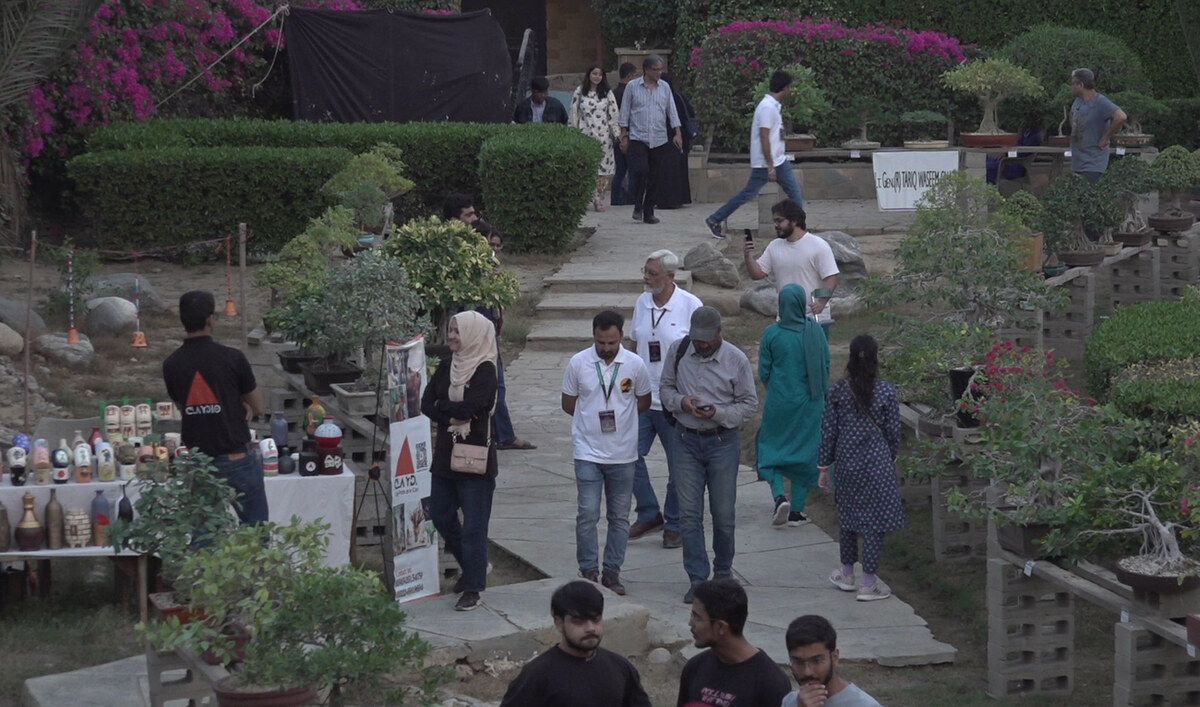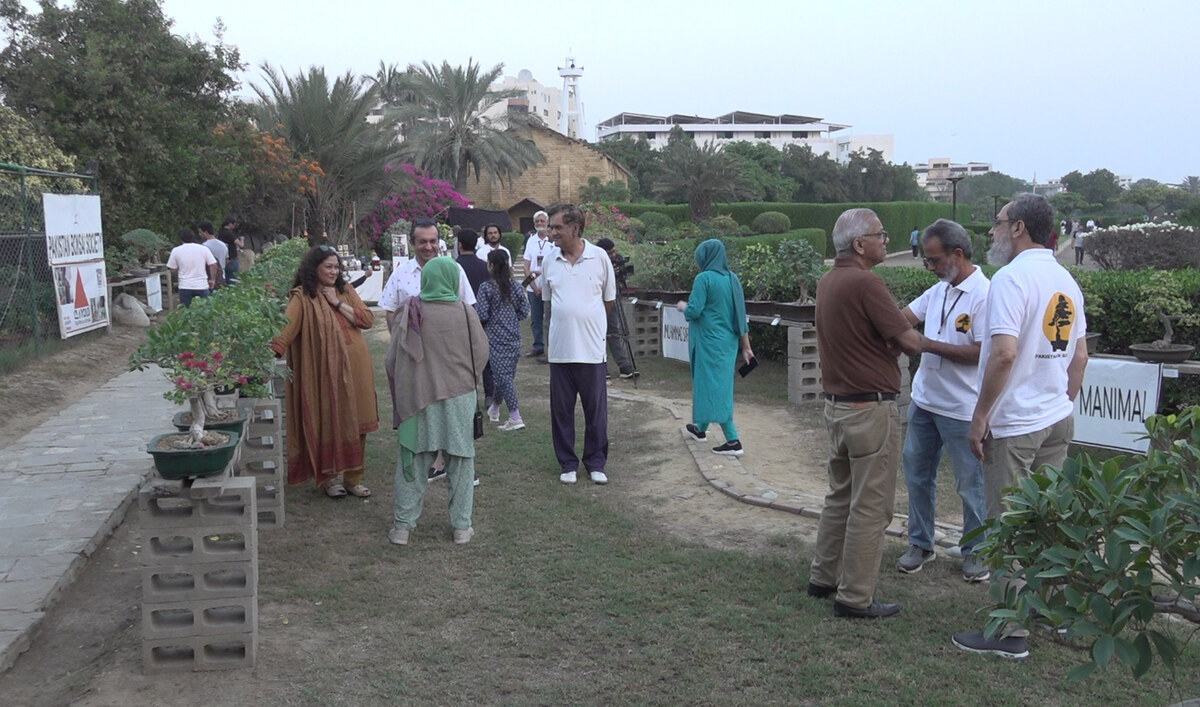KARACHI: Every year, enthusiasts of an ancient Japanese art form gather in the port city of Karachi to show off their works at the annual exhibition of the Pakistan Bonsai Society.
This year’s edition too saw members of the group putting on display trees that they had grown in containers to create a realistic miniature of mature forms. The members consider themselves artists and the miniature trees, shaped and pruned with precision and care, are not just plants for them but living sculptures rooted in history, tradition and deep personal devotion.
The practice of bonsai, or miniaturizing plants, is thought to have come to Japan from China sometime around the seventh century, when the two countries formally established diplomatic ties. Similar art forms exist in other cultures, including Korea’s bunjae, the Chinese art of penjing, and the miniature living landscapes of Vietnamese Hòn non bộ.
In the world of bonsai, every twist, turn and trim is an artistic act in which horticulture meets creativity.
“We are artists, using our horticulture knowledge and aesthetic sense, we create these bonsai,” Salman Farooqui, an enthusiast with over a decade of experience, told Arab News on Sunday, as his hands gently guided a tiny tree branch into shape.
Farooqui described bonsai as the only “recognized” living art form that traces its origins back to the ancient Gandhara civilization, which existed from around 500BC to 900AD in what is now northern Pakistan and Afghanistan, long before it became synonymous with Japan.
Buddhist monks in the ancient Taxila and Harappa cities meditated under the shade of the Peepal tree, or Ficus religiosa, with its roots intertwining with the spiritual practices of the time, according to Farooqui. The art form then shifted to Tibet in China, before it finally reached Japan.

Visitors attend the annual exhibition of Pakistan Bonsai Society in Karachi on December 1, 2024. (AN Photo)
“The imagination of Buddha was under the Peepal tree,” Farooqui said. “Japan gave it an official recognition.”
For many Karachiites, the journey into the world of bonsai began with the efforts of a visionary, the late Maj. Gen. Dr. Shaukat Ali Syed, who brought the art form to Pakistan in the 1960s and is often credited with popularizing it in the South Asian country. The Pakistan Bonsai Society itself was established in 1998, the brainchild of Dr. Syed, whose legacy lives on through its annual exhibitions and workshops.
“I saw a live bonsai for the first time at his [Dr. Syed’s] residence in Karachi when I was a child. He had been growing them since the ‘60s,” Khawaja Mohammad Mazhar, an engineer who retired from the Pakistan International Airlines (PIA) and took up the cultivation of bonsai in 1980, told Arab News.
“POTTED PLANTING”
Bonsai plants, unlike traditional potted ones, require care, patience, and expertise. They can be grown from seeds, cuttings or nursery stock. Beginning with a thicker trunk to form the base of the tree is often the quicker method but regardless of the starting point, all bonsai are treated as living sculptures that are pruned and shaped meticulously over time.
Various techniques, including painstaking pruning and wiring, are used to give the trees a mature appearance, Mazhar explained. It could take decades to complete one tree, meant to symbolize a scene from nature, and they could then survive for centuries.

Bonsai trees are seen exhibited by the Pakistan Bonsai Society in Karachi on December 1, 2024. (AN Photo)
“It’s the same normal plants, they are only trained,” Mazhar said:
“They have a shallow pot, the roots do not spread much as they are constantly trimmed, and they are kept in the same shallow container, while the shaping is controlled from the top through wiring, through weights.”
The “clip and grow” method, in which parts of the plant were selectively trimmed to encourage specific growth patterns, is a main technique of the art.
Local plants are best suited for bonsai cultivation and Karachi’s enthusiasts recommended training native species into sculptural forms that express their unique ecological and cultural climates.
“An imported plant from outside will not survive here as a bonsai,” Manzar said.
Mansoor Alam Khan, another enthusias who found his passion for the art form through the Pakistan Bonsai Society, began cultivating about 10 years ago. The practice allowed him to continue his love for planting trees in Karachi, where space is often limited.
In fact, bonsai, which literally means “potted planting,” became popular as a way of bringing nature inside for many Japanese whose small houses made gardens impossible.
“I was inclined toward planting trees since childhood but there isn’t enough space in Karachi so we couldn’t grow trees,” Khan told Arab News. “When I met these people [at the Pakistan Bonsai Society] and saw that they are growing these trees in their homes so I followed suit too. I have made a really good collection in the last 10 years.”

Visitors attend the annual exhibition of Pakistan Bonsai Society in Karachi on December 1, 2024. (AN Photo)
“Everyone talks about planting trees these days to save the environment. So, if there is not enough space, you can start gardening from your home too,” he added. “For instance, if someone has 50 plants on their rooftop, they can turn them into bonsais.”
Farooqui, who practices bonsai with his wife Ruby Salman, said though the art was in its “introductory conditions,” in Pakistan, more young people were becoming interested.
“Now, as we train more youngsters into this art form, I hope it will become known in this country in the future,” he said.
His wife added that the Internet was helping to boost interest in bonsai among younger people.
“Yes, I feel that when kids do come [to Bonsai Society] and when they come to know the whole story about the bonsai, when we tell them that how it started, they really take an interest in it.”




















